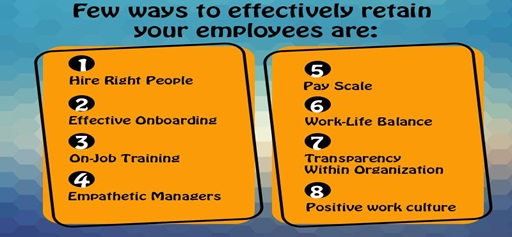Talented employees are like wine-older they are, more valuable they will be. Losing them can be a bad sign and can affect a company’s reputation. So these days companies are involved nurturing the talents through several programs like seminars, growth-opportunity programs, job rotation and international assignment. Still, study has shown that 45% of employees who leave companies every year are top talents. And this has increased during the recession and 17% of the rest employees who are left are indulge in searching for new jobs. So it is important to analyze what are the common issues they are facing from the organisation and how that can be corrected.

1. Believing that top talent are highly involved:
Research says that one of every 6 highly talented employees who are engaged in brainstorming will leave the company in one year. Also one in five are not giving their best and 3 of 8 have no or little faith in their elders. Why so many negative results? It is because there are so many options available in the market and they expect high from their organisation like career growth, promotions, opportunities and motivating projects. If these factors are not met. Their morals get down. They feel less engaged. In this time of highly competitive market, companies cannot afford to lose their high potential. So they need to improve their HR and corporate planning to make them motivated and engaged. If a company is short of monetary upliftment they can give recognition to employees by involving them in top leaders’ meetings and using other non monetary aspects.
2. Designating talents as future potential:
Up to certain extent it is true that low potentials have low growth but it is not completely true that high potentials have high growth. Our study has shown that 65% of top talents lack desired skills. What are the factors that define talent? These are expertise, involvement and desire. Expertise involves intelligence, technicality and emotions. Involvement means building interpersonal relationships and bonding at the workplace. If any of the three factors is lacking there will be high chances of talent drop. Leaders need to find a good way so that they can allocate all aspects in retaining their top talents.
3. Line manager knows employees more accurately:
Line managers are closer to employees of the company. They know their strengths and weaknesses. It is easy to delegate management to line managers else top management will select employees on the basis of daily activity and recent performance. AD&D offers these kinds of benefits to its employees. AD&D give them regular feedback and advisors as well as career growth opportunities. Each candidate receives their daily progress report and evaluation session. Even employees feel good as it will improve their ability and motivate them to contribute more.

4. Preventing high potentials from early failure:
Line managers and HR managers can ensure that companies’ talent won’t get derailed because of less utilization of their skills and talents. There should be an annual session on open discussion so that candidates with high potential get the opportunity to become successful. Most of the time talents and top skills of the company left unutilized.
5. Sharing the responsibilities:
High potential employees know how to share the burden of responsibility with line managers and executives.
Our study has shown that high potential employees pay 30% more effort than other employees. They share workload alongside their representatives. Companies change their compensation strategies so that they can help high potential to plan big. Some companies fear that this might show partiality in the organisation. So companies avoid showing and labelling high potential to anyone. But companies should make their high potential feel valuable because if you will treat everyone equally eventually you will not be able to keep your high potential for a long time.
6. Link high-potential with corporate plans:
High potentials are well aware of the corporate lifestyle, its weakness and its strength. They believe in their managers and even firms develop strategic bonds with them in future planning. Companies send them mail regarding regular updates and meetings.
Conclusion:
Companies talent their employees as a biggest asset to the company. But they need to be identified, challenged and rewarded regularly. Top most position in the organisation is not about acknowledging the talents instead engaging them in advancement of the company.

